Email marketing is a robust and effective marketing channel. New platforms and strategies emerge every year, but email remains a vital tool for businesses. Compared to other methods, it offers unmatched reach, personalization, and ROI. Artificial Intelligence (AI) and automation in their turn are making it even more effective. But exactly how effective?
We analyzed the market and conducted our own survey to understand the impact of AI and automation on email marketing. We have the figures, so read on for some insights.
What we did
We conducted a survey of 1,250 business users of the Selzy email marketing platform to gather insights on their perceptions and attitudes towards AI in email marketing.
The respondents were active paying users in the USA, the UK and Europe, mainly CEOs (founders) and marketers.
The survey aimed to understand users' views on the effectiveness of AI, their preferences for AI applications in email marketing, and their trust in AI-generated emails.
Let's delve into the survey results to uncover the key findings and trends!
Key data points
- 87.7% of Selzy users completely or mostly trust AI-generated emails.
- 58.3% of users are confident that AI can improve email newsletters.
- The AI feature that seems to be the most interesting to users is automatic content and image generation, as indicated by 39.7%, while 33.9% prioritize personalized content and newsletter.
- 38.5% of users consider AI-powered email analytics safe to use.
- 50.7% of users find AI more effective than traditional non-AI approaches in email marketing.
Survey results
Awareness of AI in email marketing
33.7% of users are unfamiliar with AI in email marketing, while 28% are well-versed in its transformative capabilities.
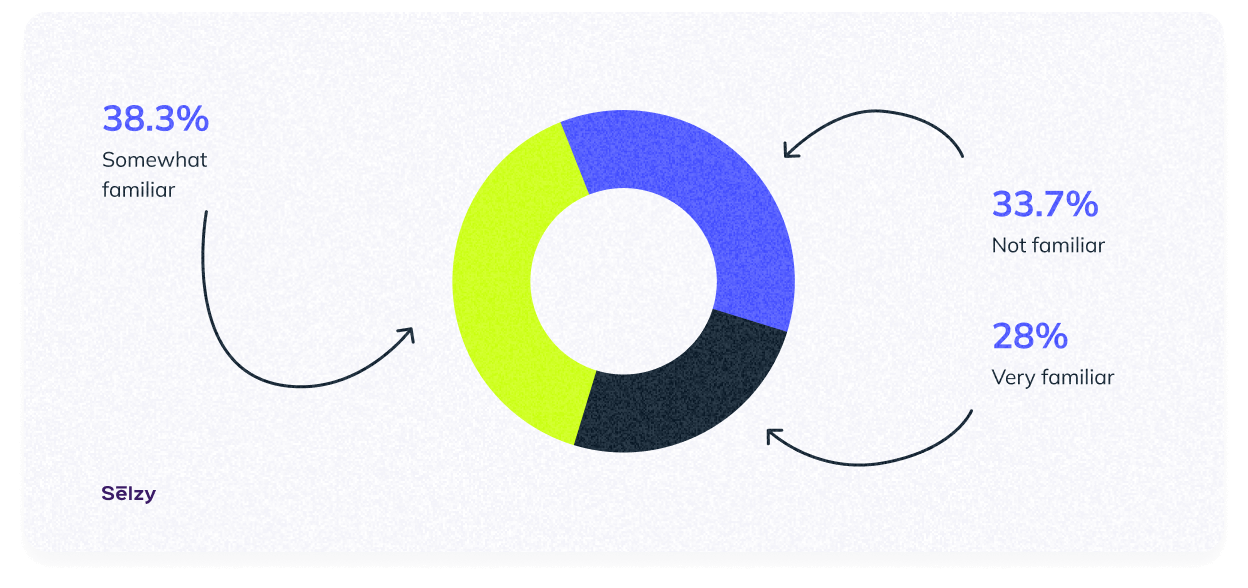
Trust in AI-generated emails
63% of users trust AI email-generation tools but double-check their work, 24.7% fully rely on AI-generated emails, and 12.3% show skepticism.
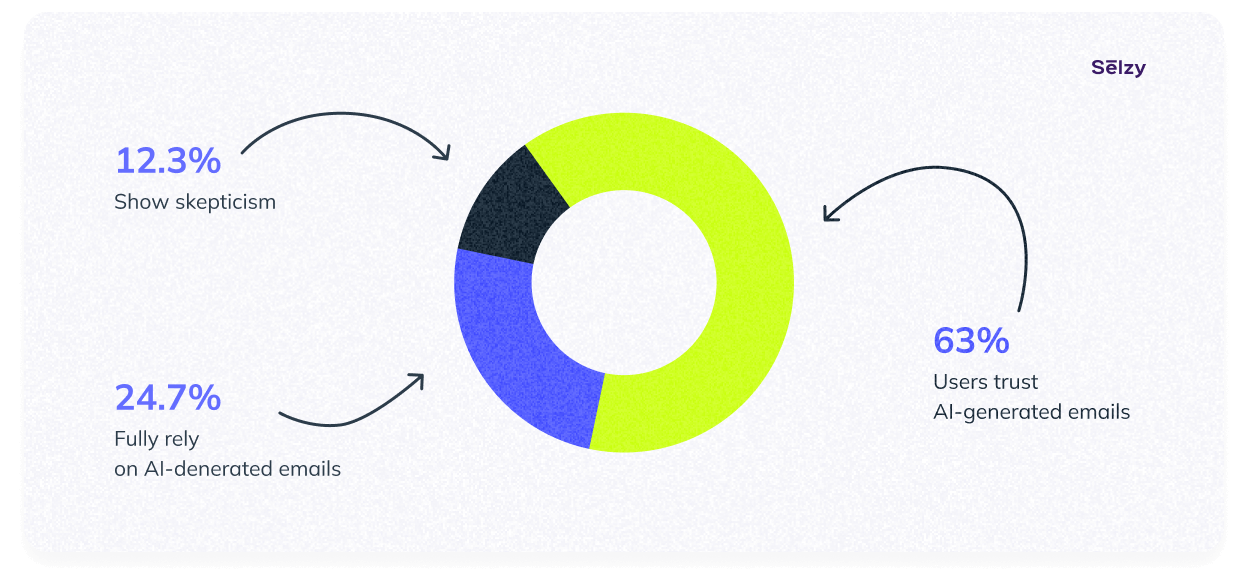
Attitude toward AI email analytics
38.5% of users consider AI-powered email analytics safe to use, while 14.1% express concerns. Interestingly enough, 42.3% of users are unfamiliar with AI for email analytics altogether.
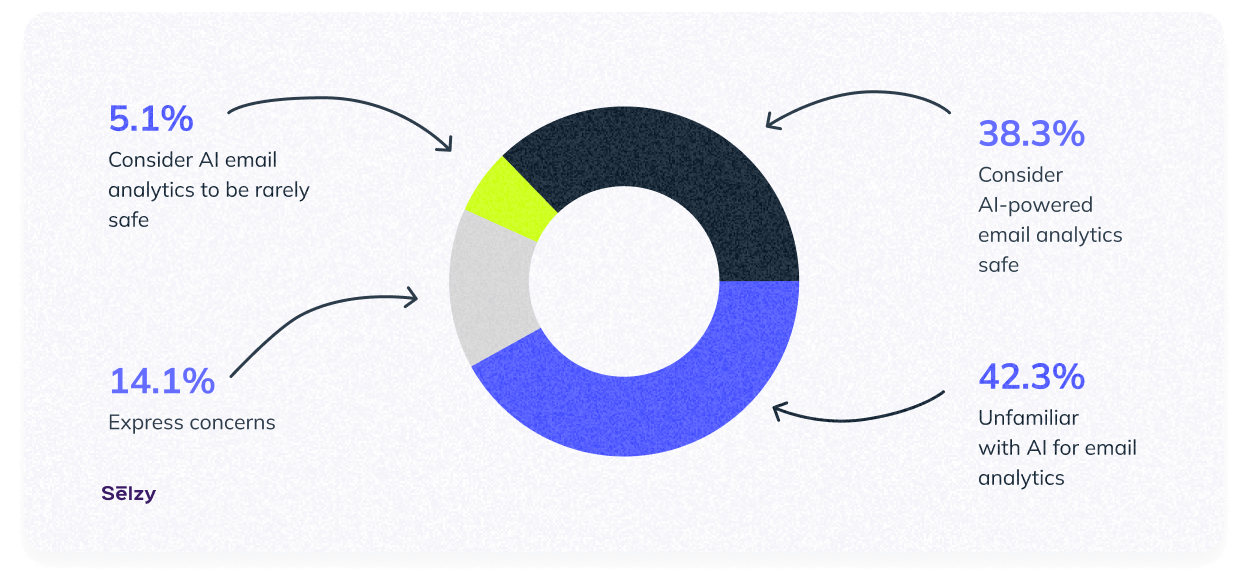
Need for optimizing email content updates
55.4% of respondents reported making changes to email content and design several times a month, 25.6% make daily changes, and 19% make changes several times a week.
These findings highlight the high frequency of email content and design changes which is time-consuming. Integrating AI, especially the generative one, can save valuable time and provide marketers with effective tools to create and optimize email content.
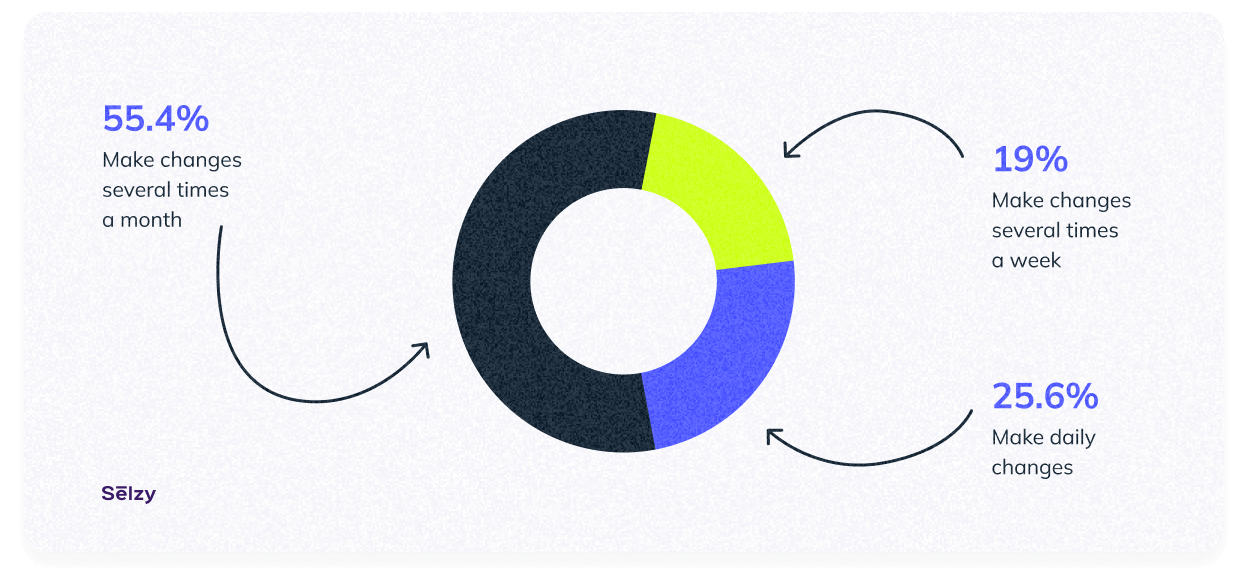
Confidence in AI
58.3% of users are confident that AI can improve email newsletters, while 33.3% are curious about its effectiveness, and 8.4% stated that AI is not impactful for email improvement.
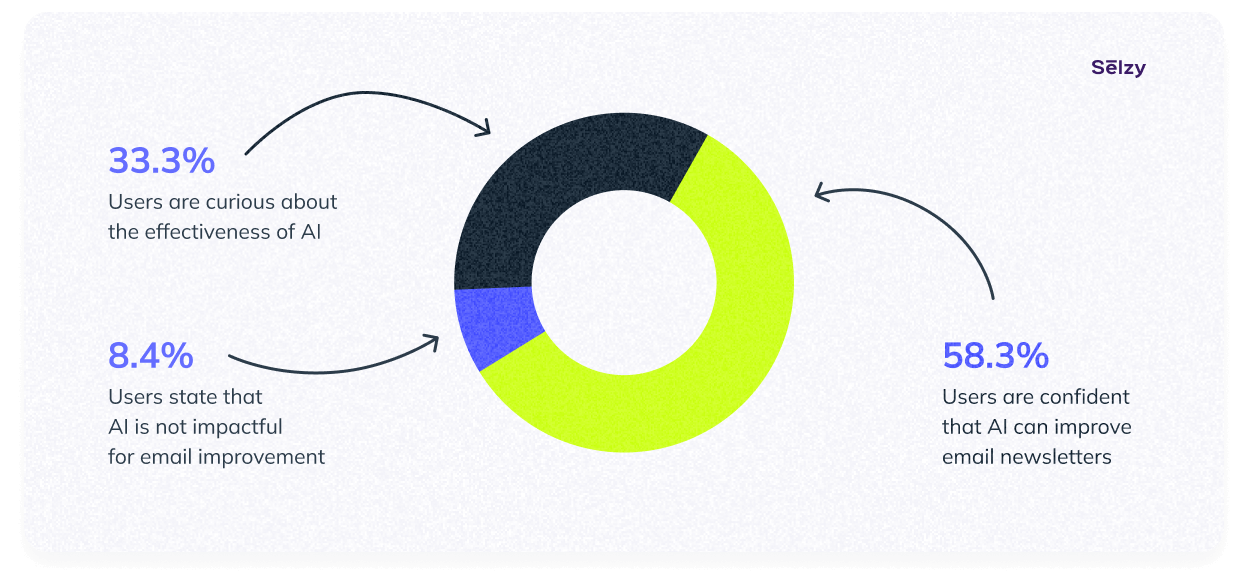
AI advantages
The majority (50.7%) of users find AI more effective than traditional non-AI approaches in email marketing.
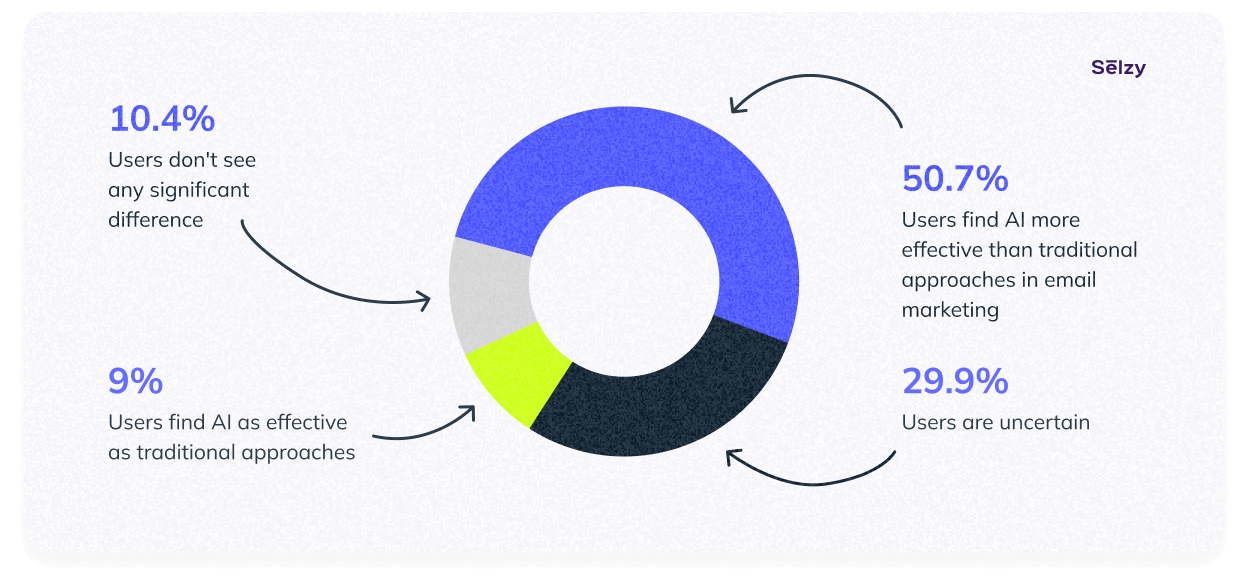
Most popular AI features
Content and image generation proved to be the most interesting AI features for 39.7% of users, while 33.9% value personalized content and newsletters. Additionally, 13.2% find determining the optimal time to send emails and filtering contacts and databases equally valuable.
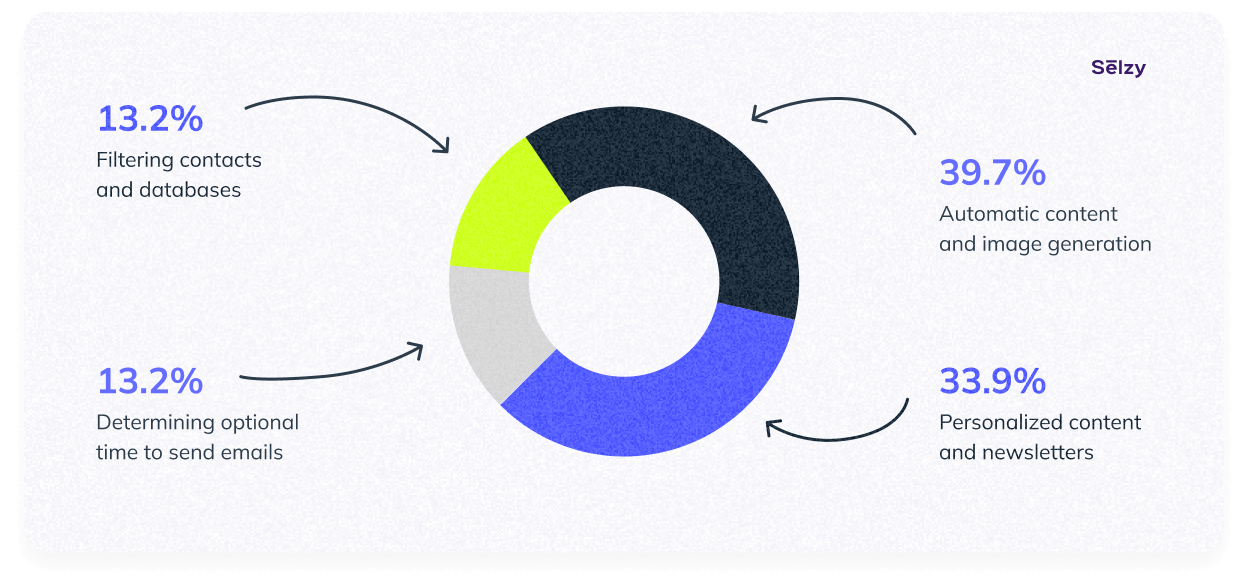
While many users see the benefits of AI, a large part of them is still unfamiliar with its capabilities in email analytics.
There's a growing interest in content generation, especially the personalized one.
It's also worth noting that although users generally trust AI tools, data privacy and security remain significant concerns.
With the survey results in hand, we now shift our focus towards the transformative potential of AI and automation in email marketing. Stay tuned as we explore the latest research and statistical insights on AI-powered personalization, segmentation, send time optimization, A/B testing, and the enhancement of email lists.
AI and automation in email marketing for better content and engagement
AI-powered tools revolutionize advertising, generating optimized content based on historical data and market trends. Email marketing is no exception, it’s been around for years and still going strong.
- Email marketing is expected to reach nearly $11 billion by the end of 2023. (Statista)
- 37% of companies increased their email budget in 2022. (Litmus)
- 56% of companies plan to increase their email marketing budget in 2023. (Neil Patel)
- 98% of companies plan to invest in AI tools in 2023. (Neil Patel)
- Bitrix24 revealed there was a 39% increase in email sending using their CRM in 2022 which indicates a demand for automation. (Bitrix24)
- About 13.7% of email senders are using AI tools, which may indicate that email AI has transcended the “early adopters” stage. (Mailjet)
- Case study revealed, Hotel Chocolat achieved great results with AI optimization of sending frequency. They experienced a 40% decrease in unsubscribe rate and a 25% increase in revenue. This demonstrates the potential for improved ROI through AI-driven email marketing. (LinkedIn)
- AI adoption is most commonly used in service operations optimization (24%), closely followed by the creation of new AI-based products (20%), customer segmentation (19%), customer service analytics (19%), enhancement of products through AI (19%), and the customer acquisition and lead generation (17%). (Stanford)
- On average, 44% of marketers create 2-3 versions of each email, while 18% develop 4-6 versions. (Litmus)
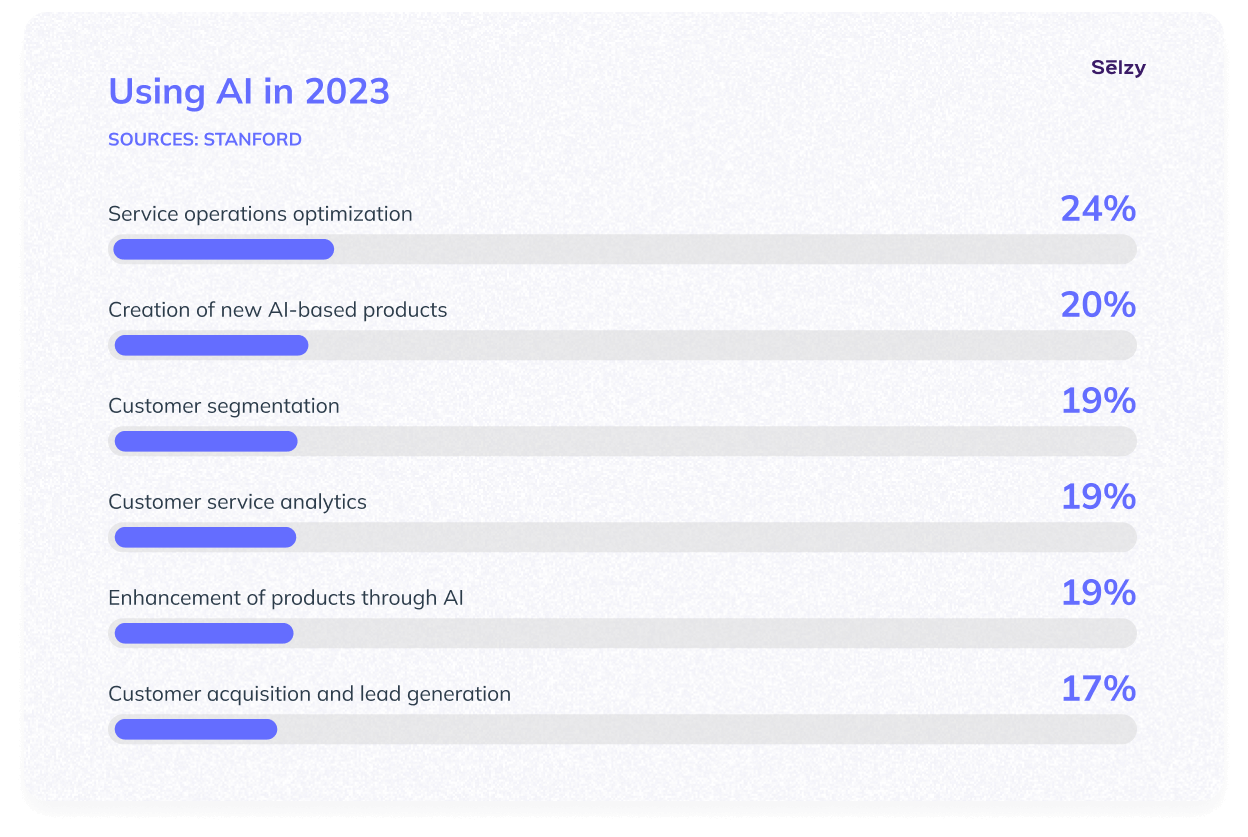
- 83% of companies using AI for sales and marketing saw a cost decrease, and 27% of them stated the decrease by more than 20%. (McKinsey)
- 74% of companies reported revenue increase from AI adoption in marketing and sales, with 11% stating more than a 10% increase. (McKinsey)
Exploring email marketing optimization with AI and automation
One of email marketers’ main challenges is to effectively use the vast amount of subscriber data. Understanding preferences, behaviors, and hidden patterns within is crucial for delivering tailored experiences.
Manual segmentation, analysis and similar tasks are time-consuming and prone to errors. This is why there is a growing demand for AI and automation solutions that can analyze subscriber data, automate segmentation processes, and deliver personalized content at scale.
- AI-powered analytics AI can analyze vast amounts of subscriber data, identifying preferences, behaviors, hidden patterns, and interests. This deep understanding enables marketers to tailor their content specifically to each individual, increasing the chances of engagement. It’s been found that nearly half of organizations (46%) lack access to vital real-time data. Implementing marketing software and AI can help companies gather and process this data. (Adobe)
- Segment-based content Subscriber segmentation is one of the most effective strategies in email marketing campaigns. AI helps segment subscribers into groups based on demographics, preferences, or past interactions. By creating content tailored to each segment's unique characteristics, marketers can deliver more targeted and relevant messages, enhancing engagement.
- Personalization Personalization goes beyond simply using a subscriber's name in the email. AI allows marketers to dynamically populate emails with personalized product recommendations, content suggestions, and exclusive offers. This level of personalization fosters a sense of individual attention, building trust and loyalty, and leading to higher open rates, click-through rates, and overall engagement. Focus on contact segmentation, offer adjustment, individual discounts, coupons, and birthday gifts. Most marketers (88.52%) no longer prioritize personalization in subject lines, as the CTR of non-personalized emails is nearly 2x higher (2.49% vs. 1.29%) (GetResponse)
- Processes automation AI automates report generation and presents key metrics, visualizations, and actionable recommendations in a clear and concise manner. It can also help streamline the whole email marketing including send time and general workflow optimization. Workflow challenges continue to impact organizations' ability to keep pace with customers' needs, with almost half (43%) of practitioners identifying workflow issues as a critical internal barrier affecting their marketing organization. (Adobe)
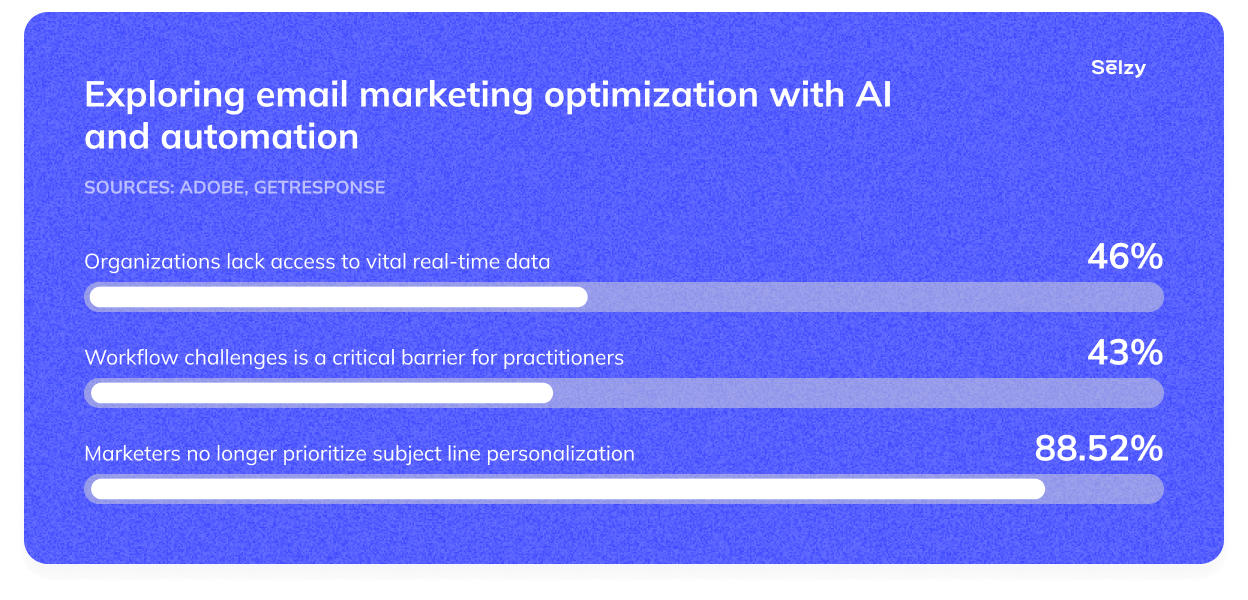
So, by harnessing AI-powered analytics and automation processes, marketers can unlock the full potential of email marketing and deliver highly targeted and personalized content.
AI-powered segmentation and targeting
To meet the expectations of tech-savvy consumers, address shifting preferences, and respond to the influence of COVID-19, businesses must learn to segment data better. Artificial intelligence is the way to enable data-informed behavioral segmentation.
- Segmented, targeted, and triggered campaigns account for 77% of marketing ROI. (DMA)
- Segmented campaigns outperform non-targeted campaigns by 50% in terms of click-through rates (CTR). (Higher Logic)
- Behavioral segmentation in email marketing messaging alone can contribute to a substantial 58% of total revenue. (DMA)
- For 18% of organizations, personalized targeting relies on historical customer data, while 24% limit personalization to broader segmentation approaches. (Adobe)
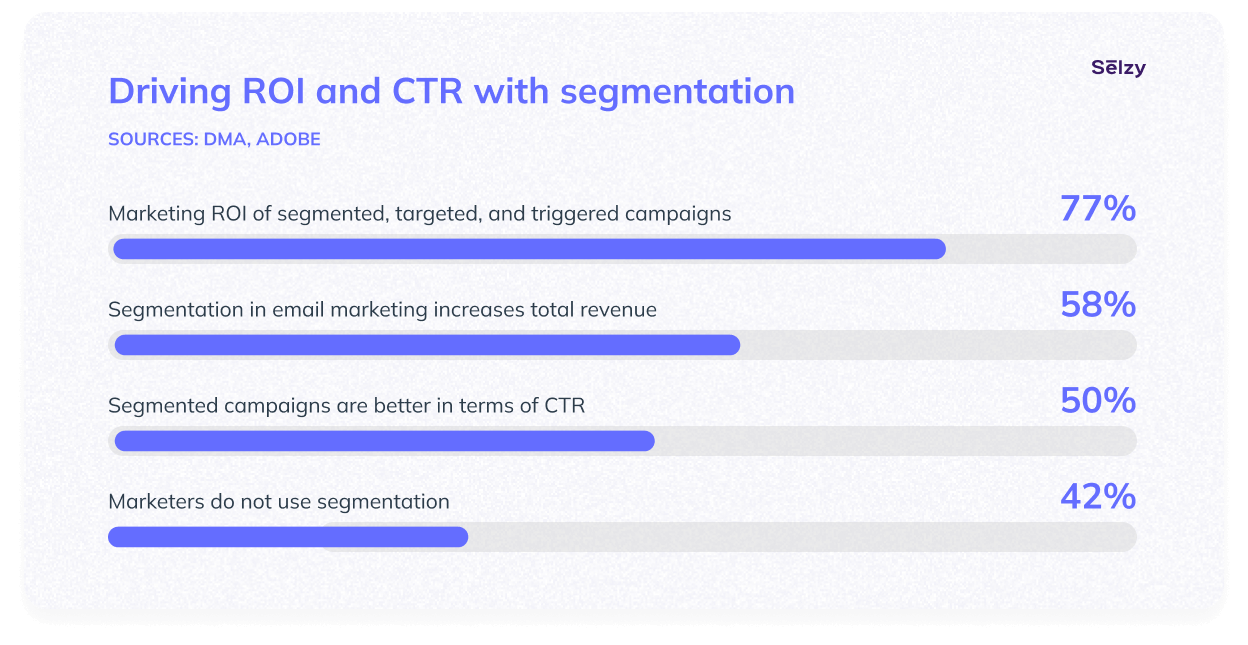
AI empowers marketers to move beyond basic demographic segmentation and delve into deeper, more meaningful audience targeting.
- Behavioral segmentation: AI can analyze user behavior, such as past purchases, browsing history, and engagement patterns, to identify segments with specific interests or intent. This behavioral segmentation enables marketers to deliver highly targeted content that resonates with individual preferences.
- Predictive analytics: AI algorithms can predict future customer behaviors based on historical data, allowing marketers to anticipate subscriber needs and tailor their content accordingly. This proactive approach helps build long-term relationships and boosts engagement.
- Automated triggers: AI-powered automation tools can identify specific triggers, such as abandoned carts or website visits, and send timely and personalized emails to re-engage subscribers. These triggered emails have higher open and click-through rates, increasing overall engagement.
Potential challenges and limitations of using AI and automation in email marketing
In the era of AI and automation, making better use of data has become paramount for organizations seeking to maximize their efficiency. Still, there are some challenges that can restrict the seamless adoption of AI algorithms.
- Data quality and quantity: AI algorithms need high-quality data to work effectively. If the data is low quality or there is not enough data, it can limit the accuracy of the AI.
- Human oversight and interpretation: As AI algorithms become more advanced, human oversight and interpretation become more important to ensure that they are working as intended.
- Integration with legacy systems: Introducing AI and automation into existing workflows can pose technical challenges and require integration with legacy systems, which can be difficult and time-consuming.
How to overcome these challenges? Try implementing proper data management practices, using hybrid approaches that combine AI and human efforts, and partnering with experienced service providers.
Personalizing content and campaigns with AI
Driving revenue growth through personalization
Successful personalization relies on a deep understanding of user segments and behavioral patterns, precisely the task AI excels at. By delivering relevant experiences through personalization, businesses can significantly enhance their email marketing outcomes.
- Notably, nearly 80% of business leaders recognize that personalized experiences lead to increased consumer spending, with an average increase of 34%. (Twilio)
- Only a small percentage (9%) of organizations currently personalize content based on intent or prediction, indicating a potential area for growth in personalization efforts. (Adobe)
- 14.8% of marketers don’t personalize emails (Mailjet)
- 71% of consumers expect personalized communications and products/services from businesses. (McKinsey)
- 76% of consumers get frustrated when experiences are not relevant to them. (McKinsey)
- Companies that excel in personalization activities generate 40% more revenue compared to average players, according to research findings. (McKinsey)
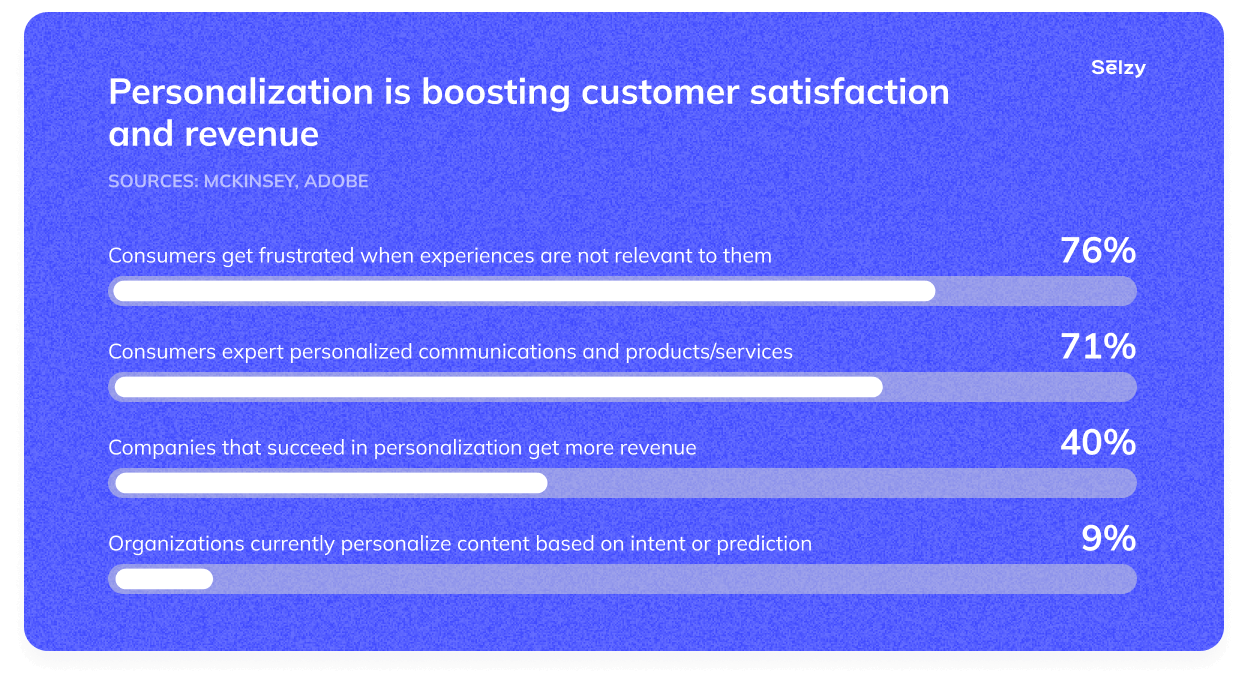
- Implementing top-quartile personalization performance across various industries in the US has the potential to generate more than $1 trillion in value. (McKinsey)
- 40% of companies consider obtaining accurate customer data for personalization as a significant challenge. (Twilio)
- 78% of consumers unsubscribe from emails because they receive too many messages (Hubspot)
- 59% of best-in-class marketers consider personalization the best tactics to boost engagement (Mailjet)
AI-powered personalization and localization
- 35% of companies deploying AI are using it to create more personalized experiences. (IBM)
- Personalized emails achieve 2.5 times higher click-through rates and generate 6 times more sales. (Experian & VentureBeat)
- AI-powered copywriting tool Phrasee helped JOANN to increase email open rates by 10% and provided 57% email click uplift for Domino’s (Phrasee)
- 13.7% of email marketers say they plan to use AI-powered tools like ChatGPT to assist in their work. (Mailjet)
- AI-powered personalization in marketing can increase ROI by up to 70%. (Litmus)
- 70% of companies implementing advanced AI-driven personalization reported earning a 200% ROI or higher (Kibo)
- 65% of consumers prefer content in their language, while 40% won’t buy from a website that provides content in other languages. (CSA Research)
- Companies that translated information to maintain their positions or outperform competitors had a 2.04 times higher likelihood of increasing profits and a 1.27 times higher likelihood of boosting earnings per share (EPS). (CSA Research)
- Sport Nutrition reports that running an email campaign in English for the entire database results in an open rate (OR) of 3-4%. However, when they conduct email campaigns in multiple languages, the open rate significantly increases to an impressive 40%. (Stripo)
- 39% of marketers reported they are using Machine Translation (MT) as part of their localization strategy. (Unbabel)
- Campaigns with Send Time Optimization (STO) experience a 5% to 10% increase in opens and clicks. (Mailgun)
AI-generated content to boost personalization
Adding generative AI in email marketing processes is common now as companies have to use massive volumes of content for personalized campaigns. The time-consuming nature of creating such vast amounts of content prompts companies to turn to generative AI as a solution. Our survey revealed that 25.6% of email senders make design and email content changes daily.
Basically, generative AI can help marketers in 2 ways:
- Content generation With generative AI, email marketers can generate personalized and relevant email content more efficiently and at scale. They analyze patterns and trends in successful campaigns, and customer behavior which provides them with suggestions for subject lines, body text, and calls-to-action.
- Creativity boost Generative AI serves as a creative partner, offering unique and out-of-the-box suggestions that inspire email marketers to think beyond traditional approaches and create memorable and impactful content, based on real data.
AI tools for email marketing:
Generative AI tools for copywriting and ideation:
- ChatGPT: the most known generative AI tool which not only can help with copywriting but also can help with creative process.
- Jasper AI: content marketing AI tool trained to write original, engaging texts, translate them and help SEO optimize it.
- Copy.ai: writing assistant that helps generate catchy subject lines, persuasive email copy, and compelling calls-to-action, enabling businesses to optimize their email marketing campaigns.
- Phrasee: Uses AI to optimize subject lines and email copy for improved engagement and click-through rates.
- Persado: Employs AI to generate emotionally compelling email content that resonates with recipients.
AI tools for personalization, segmentation and automation:
- Emarsys: Predictive marketing tool enables AI-driven segmentation, content selection, channel execution, and timing
- IBM Watson Marketing: A suite of AI-powered tools that includes sentiment analysis, predictive analytics, and customer segmentation to improve marketing effectiveness.
- Brevo: Offers AI-driven personalization and automation features to enhance email campaign performance.
- Crystal: An AI-powered tool that analyzes personality traits and communication styles to provide insights for better customer interactions and sales messaging.
- Campaign Monitor: Utilizes AI to provide data-driven insights and optimize email campaign elements.
- Selzy: Marketing automation tool that helps streamline email campaigns and also gives opportunity to build and optimize emails with AI.
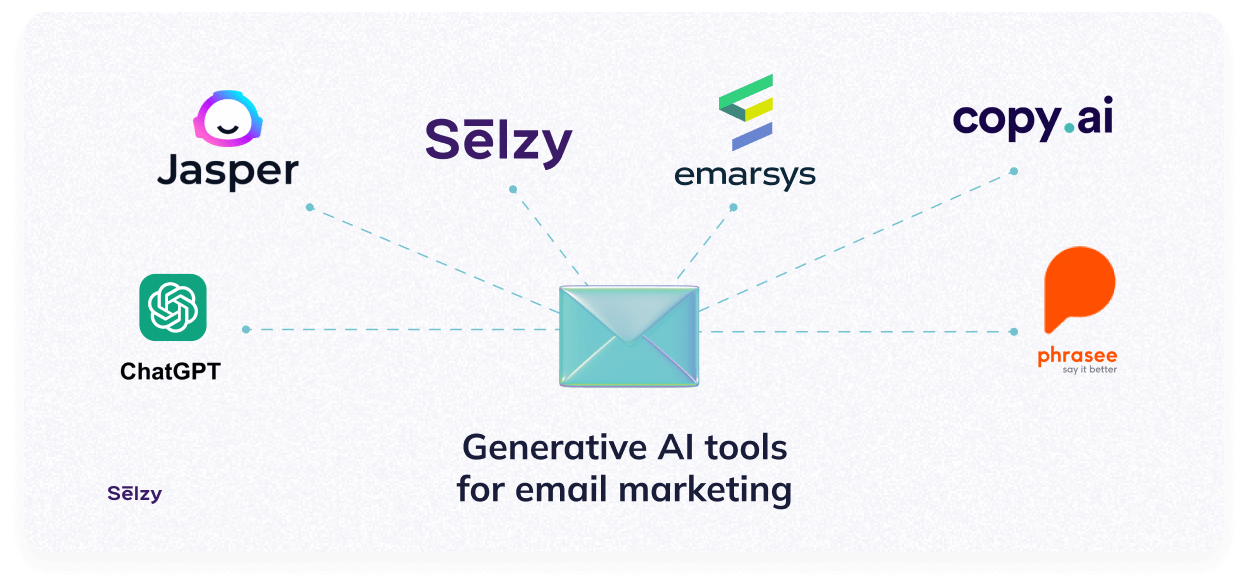
Leaders in personalization achieve remarkable outcomes by tailoring offerings and outreach to the right individual, precisely at the right moment, and delivering exceptional experiences. In recent years, markets and industries have experienced significant changes, including a shift in customer behavior. Customers now actively seek value and expect content and messaging tailored specifically to their needs. By leveraging email marketing personalization, companies can not only enhance engagement but also foster customer loyalty.
Conducting effective A/B tests with AI
The role of A/B testing
- The global market for A/B testing software is projected to reach $1249.57 million by 2028, with a CAGR of 11.62% from 2021 to 2028. (Verified Market Research)
- Brands that use an extensive testing checklist report an ROI of 40:1. (Hubspot)
- A/B testing is widely used for conversion optimization and is the second most popular method after analytics. (CXL)
- 73% of experimenters stop the experiment just when a positive effect reaches 90% confidence. (SSRN)
- Around 20% of controlled experiments conducted by Google and Bing yield positive results, supporting the new ideas being tested. (Harvard Business Review)
- Research by VWO and Convert.com both showed that only 1 in 7 A/B tests are conclusive, with the remaining tests failing to reach a clear conclusion. (VWO & CXL)
- By implementing email quality assurance (QA), A/B testing, and spam testing email marketing ROI can be increased by up to 28%. (Litmus)
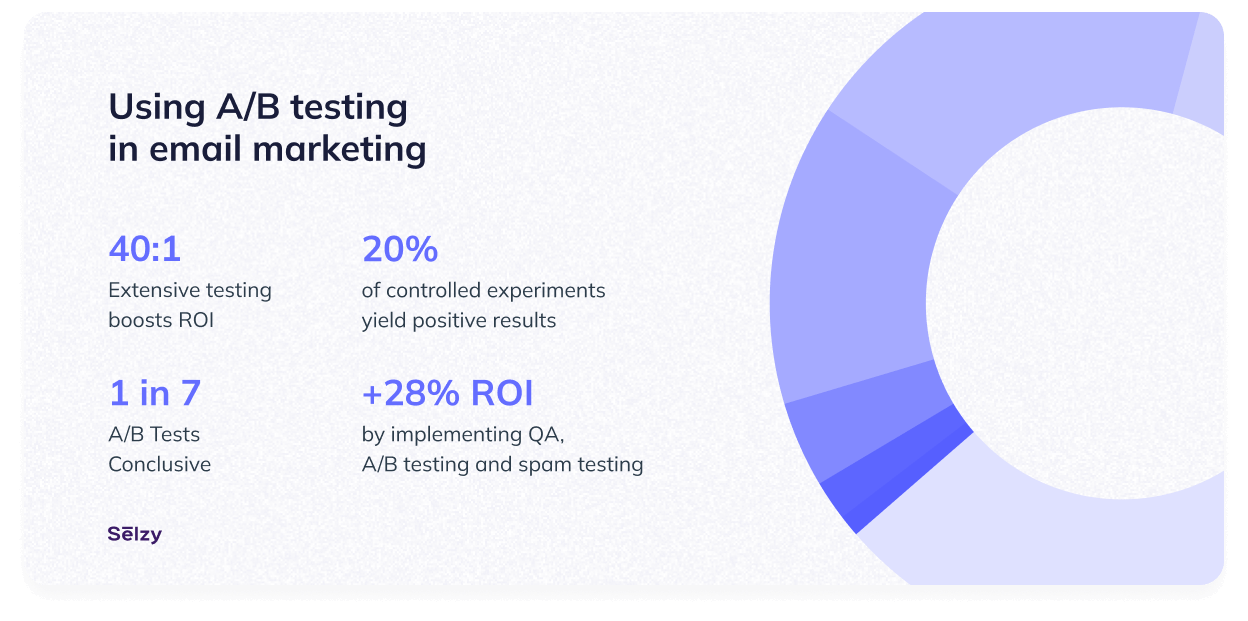
This data shows that A/B testing is a crucial experimentation method to optimize metrics, but it can be costly and presents various challenges. Still, it offers valuable learning opportunities for businesses. AI-powered A/B testing introduces significant improvements to the process.
With the ability to analyze large volumes of data, AI algorithms can identify patterns and generate valuable insights for optimizing variations. Real-time results provided by AI-powered testing enable faster decision-making and iterative improvements. AI has the potential to uncover hidden patterns and interactions that may go unnoticed by humans. It overcomes limitations by handling complex multivariate testing scenarios, considering multiple variables simultaneously, and finding optimal combinations for better outcomes.
AI algorithms also continuously adapt and learn, leading to ongoing enhancements in the testing process.
Exploring AI impact on A/B tests effectiveness
- Dynamic traffic allocation: AI algorithms intelligently allocate traffic in real-time to different variations, maximizing the impact of successful ones and minimizing exposure to underperforming variations.
- Automated analysis for faster results: AI automates the analysis of A/B test results, swiftly determining statistical significance, calculating confidence intervals, and identifying winning variations more accurately than manual analysis.
- Real-time optimization: AI continuously optimizes A/B tests using real-time data, adapting test parameters to achieve statistically valid results faster and with fewer resources.
- Targeted testing: AI enables personalized A/B testing by tailoring variations to user segments based on behavior, preferences, or demographics. This leads to more relevant tests, resulting in higher engagement and conversion rates.
- Actionable insights and recommendations: AI-powered analytics tools provide actionable insights and recommendations based on A/B test data. They uncover patterns, correlations, and user segments that perform better with specific variations, guiding future optimization strategies.
- Efficient multivariate testing: AI handles complex multivariate testing scenarios, analyzing interactions between multiple variables to identify the optimal combination for the best outcome.
AI-powered software for A/B tests and other experimentation methods
- ABtesting.ai – optimizes A/B testing and experimentation processes.
- Evolv.ai – experimentation processes optimization and automation.
- Tricentis – empowers comprehensive experimentation and testing.

Mistakes to avoid when conducting A/B tests with AI
“AI today is unbelievably intelligent and then shockingly stupid” – Yejin Choi (Brett Helsel Professor of Computer Science at the University of Washington)
AIs are great, but they are not perfect. AI is just another tool that helps make the process easier and more efficient and reduces the possibility of human error. However, human expertise will never be replaced by machines, professionals have to monitor the work of AI and guide it in the right direction
Key points to keep in mind for high-quality and resource-efficient results:
- Balancing AI recommendations with human expertise: Avoid relying solely on AI recommendations for A/B testing and incorporate human expertise and domain knowledge to ensure unbiased and accurate test setups and interpretations.
- Ensuring data quality assurance: Prioritize data quality assurance processes to prevent errors or biases in the data used for A/B testing. Validate data accuracy, consistency, and reliability before conducting tests.
- Effective feature engineering: Emphasize proper feature engineering when utilizing AI algorithms for A/B testing. Select relevant features and create meaningful variations to optimize performance and yield valuable insights.
- Sufficient and representative training data: Ensure an adequate and diverse set of training data for AI models used in A/B testing. Insufficient training data can lead to poor generalization and inaccurate predictions, compromising the validity of the tests.
It is important to note that ethical considerations, regular monitoring of AI models, and adhering to ethical guidelines should be an integral part of the A/B testing process.
Improving email list quality with AI-powered verification and filtering
Analyzing the importance of an optimized email contact database
- 25% of companies deploying AI are using it for email or text classification (IBM)
- Segmented email campaigns generate 101% higher CTRs compared to non-segmented campaigns. (Mailchimp)
- Bitrix24 survey showed that 19.6% of their CRM users leverage contact management tools (Bitrix24)
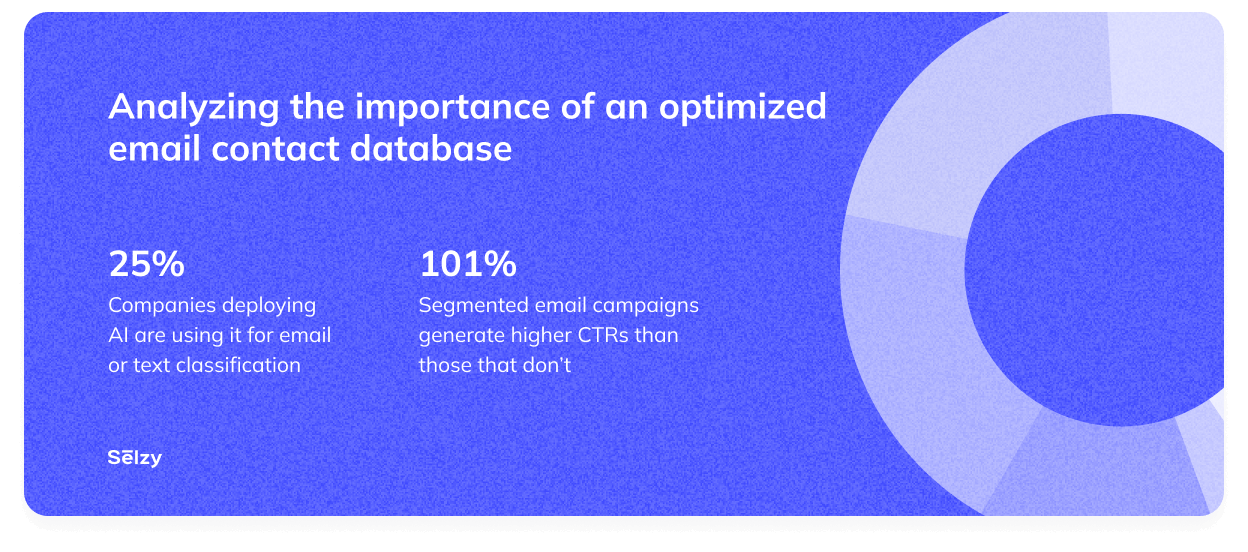
AI impact on email list quality and segmentation
- List segmentation: AI analyzes subscriber data to segment email lists based on demographics, behaviors, and preferences, delivering targeted content for better engagement and more conversions.
- List hygiene: AI-powered tools identify and remove invalid email addresses, duplicates, and inactive subscribers, ensuring better deliverability and avoiding spam traps.
- Predictive analytics: AI analyzes subscriber behavior to predict email list churn, allowing targeted retention strategies to maintain an engaged and healthy email list.
- Compliance: AI automates processes like opt-in management and consent tracking, ensuring compliance with data protection regulations and maintaining brand reputation and subscriber trust.
Maintaining GDPR compliance: AI solutions for data privacy and quality
- AI can automate GDPR compliance processes such as data classification, data mapping, and consent management, and can also help identify potential GDPR violations.
- An AI framework for GDPR compliance involves identifying key requirements, defining data fields to monitor, and selecting appropriate AI technologies.
- AI solutions for data privacy and quality include tools for data classification, mapping, consent management, anomaly detection, and access control.
- Best practices for implementing AI in GDPR compliance include identifying key requirements, selecting AI tools, developing a data privacy strategy, and regularly monitoring compliance.
Summary
The research highlights the immense potential of AI in email marketing. AI has emerged as a powerful tool because of the demand for personalization, intensifying competition among businesses, and advancements in data analysis capabilities.
AI brings a range of enhancements to email marketing campaigns. For example, it enables precise and advanced user segmentation, effective A/B tests, automated reports, and analysis.
AI can also help businesses to deliver personalized experiences by customizing the content, providing recommendations, identifying the optimal time to send emails, and many more.
As fully autonomous AI systems are not currently available, a more practical approach involves humans and AI collaborating in harmony. It allows marketers to delegate routine and monotonous tasks to AI, freeing up time for creativity and higher-level work tasks.















